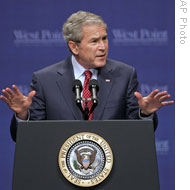-
(单词翻译:双击或拖选)
 |
| President George W. Bush addresses cadets in Eisenhower Hall at the US Military Academy in West Point, New York, 09 Dec 2008 |
President Bush says throughout the period the U.S. military has undergone a transformation2 for a new kind of war the country is facing now and will continue to face in the future.
President Bush, who leaves office January 20, spoke3 to the cadets for his last time as commander-in-chief.
Mr. Bush has presided over two long-running wars in Afghanistan and Iraq, and in during his eight years in office he said the country has changed its approach to national security. The president said dramatic changes were made in both the military's strategy and the military itself.
"We resolved that we would not wait to be attacked again, and so we went on the offense4 against the terrorists overseas so we never had to face them here at home," he said.
The president said his administration made it clear that governments that sponsored terror are as guilty as the terrorists, and this doctrine5 was applied6 in both Afghanistan and Iraq. He added that the only way to defeat terrorism in the long run is to present an alternative to their ideology7.
"We are doing the tough work of helping8 democratic societies emerge as examples for people all across the Middle East, pressing nations around the world, including our friends, to trust their people with greater freedom of speech, worship, and assembly," said Mr. Bush.
The president said the country has also made significant reductions in the U.S. nuclear arsenal9, which he says will be at its lowest level since the Eisenhower administration.
But he said it is important that the country continues to develop the capabilities10 to fight enemies around the world.
"We must stay on the offensive. We must be determined11 and we must be relentless12 to do our duty to protect the American people from harm," President Bush said.
Mr. Bush said the United States must continue to transform the armed forces so the next generation inherits a military capable of advancing the cause of peace.
 收听单词发音
收听单词发音
1
defense

|
|
| n.防御,保卫;[pl.]防务工事;辩护,答辩 | |
参考例句: |
|
|
|
2
transformation

|
|
| n.变化;改造;转变 | |
参考例句: |
|
|
|
3
spoke

|
|
| n.(车轮的)辐条;轮辐;破坏某人的计划;阻挠某人的行动 v.讲,谈(speak的过去式);说;演说;从某种观点来说 | |
参考例句: |
|
|
|
4
offense

|
|
| n.犯规,违法行为;冒犯,得罪 | |
参考例句: |
|
|
|
5
doctrine

|
|
| n.教义;主义;学说 | |
参考例句: |
|
|
|
6
applied

|
|
| adj.应用的;v.应用,适用 | |
参考例句: |
|
|
|
7
ideology

|
|
| n.意识形态,(政治或社会的)思想意识 | |
参考例句: |
|
|
|
8
helping

|
|
| n.食物的一份&adj.帮助人的,辅助的 | |
参考例句: |
|
|
|
9
arsenal

|
|
| n.兵工厂,军械库 | |
参考例句: |
|
|
|
10
capabilities

|
|
| n.能力( capability的名词复数 );可能;容量;[复数]潜在能力 | |
参考例句: |
|
|
|
11
determined

|
|
| adj.坚定的;有决心的 | |
参考例句: |
|
|
|
12
relentless

|
|
| adj.残酷的,不留情的,无怜悯心的 | |
参考例句: |
|
|
|















